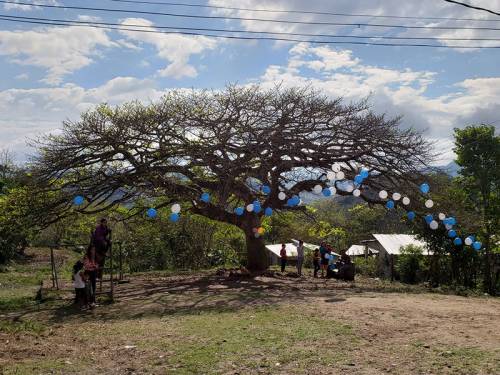Some days it’s hard to find, but it’s always there
By Dori Hjalmarson | Presbyterians Today

In a village near Trinidad de Copán, Honduras, a large tree shades the community playground and gathering place that were developed and built in partnership with U.S. Presbyterians. Dori Hjalmarson
Living in Honduras during the spring and summer has felt especially difficult and intense. What started as a labor dispute between teachers’ and doctors’ unions and the government has become agitation against government corruption and economic desperation. Classrooms from elementary to university have been closed at various times, and public hospitals have not been attending patients. Taxi and bus drivers have been occasionally involved in blocking streets and shutting down cities. The U.S. Embassy was vandalized and has been partially closed.
It is difficult for me to see God in this environment. If God is in the rule of law, there is little of that. If God is in social and economic justice, there is even less. If God is in peace, compromise and goodwill, there is almost none.
Some days I have had to look very closely for the smallest sign of God’s presence. Mark’s Gospel gives me an image that I can hold onto: With what can we compare the kingdom of God, or what parable will we use for it? It is like a mustard seed, which, when sown upon the ground, is the smallest of all the seeds on earth; yet when it is sown, it grows up and becomes the greatest of all shrubs, and puts forth large branches, so that the birds of the air can make nests in its shade.
What can I take from this seemingly simple image? The kingdom of God is very small. It is planted in earthly soil. It doesn’t necessarily put an end to the burning, life-threatening sun scorching the earth. But it does provide shade, a sanctuary, open for all.
I recently accompanied a delegation from the Presbyterian Church (U.S.A.) Advisory Committee on Social Witness Policy, which is completing a General Assembly directive to write a comprehensive study of Central America. In Honduras, we visited a government reception center for migrants deported from North America and heard from individuals and families directly affected by the push and pull of the immigration process.
We heard from Joana, a nun and an immigrant from Brazil, who serves migrants at the Honduran government center, which receives up to 10,000 deportees weekly from the United States and Mexico. She and her team of volunteers were once up for four days straight receiving flights of 250 passengers each that arrived at all hours of the day and night. As the young men and women disembarked, wearing U.S. Customs-issued gray sweats and white T-shirts and carrying their possessions in garbage bags, her message was: “God loves you. I love you. You are worthy of love.” And she gave them coffee, a little food and a smile.
One of my friends and colleagues, a Honduran church leader and theological student, is in Mexico. He left Honduras in March, looking for work because low coffee prices left his farm in debt he can’t pay. He is away from his wife for the first time in their marriage. Traveling with a guide he trusted but who is extorting his family for more money for “safe passage” to the United States, my friend is in what seems to me a hopeless situation. Each day he has weighed the risks and rewards of continuing his attempt or returning home.
“God is with us. God is here, sister Dori,” he has told me on the phone. “I have my Bible with me. The word of God is here among us, and I’m able to share it with lots of people here with me. I have faith.”
My friend’s wife called me yesterday with “the best news ever.” Her husband is on his way home. For him, crossing the border was a failed attempt, a financial loss. For her, success lies in the hope of reunification of her family. “Pray for a job for him,” she said.
The kingdom of God is so much more complex than we imagine. In a bleak and hopeless landscape, we find little spots of light. Amid oppression and desperation, we find the hope cultivated by family connection. We find dignity — shady spots for our nests — under the tree of God’s presence in our created world.
Dori Hjalmarson serves as the primary Presbyterian World Mission liaison to the Honduras Mission Network, collaborating with the Presbyterian Church of Honduras and facilitating partnerships between Honduran and U.S. Presbyterians. Hjalmarson’s home presbytery is the Presbytery of Santa Fe, and she is active in Las Placitas Presbyterian Church in Placitas, New Mexico.
Learn More
Find out more about Dori Hjalmarson’s ministry
Support Presbyterian Today’s publishing ministry. Click to give
![]() You may freely reuse and distribute this article in its entirety for non-commercial purposes in any medium. Please include author attribution, photography credits, and a link to the original article. This work is licensed under a Creative Commons Attribution-NonCommercial-NoDeratives 4.0 International License.
You may freely reuse and distribute this article in its entirety for non-commercial purposes in any medium. Please include author attribution, photography credits, and a link to the original article. This work is licensed under a Creative Commons Attribution-NonCommercial-NoDeratives 4.0 International License.
Categories: Presbyterians Today, World Mission
Tags: advisory committee on social witness policy, corruption, deportation, dignity, honduras, immigration, poverty, social justice, violence
Ministries: Presbyterians Today, World Mission